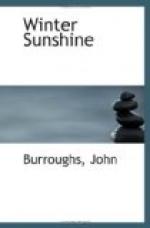Yet the English apple is a tame and insipid affair, compared with the intense, sun-colored, and sunsteeped fruit our orchards yield. The English have no sweet apple, I am told, the saccharine element apparently being less abundant in vegetable nature in that sour and chilly climate than in our own.
It is well known that the European maple yields no sugar, while both our birch and hickory have sweet in their veins. Perhaps this fact accounts for our excessive love of sweets, which may be said to be a national trait.
The Russian apple has a lovely complexion, smooth and transparent, but the Cossack is not yet all eliminated from it. The only one I have seen—the Duchess of Oldenburg—is as beautiful as a Tartar princess, with a distracting odor, but it is the least bit puckery to the taste.
The best thing I know about Chili is, not its guano beds, but this fact which I learn from Darwin’s “Voyage,” namely, that the apple thrives well there. Darwin saw a town there so completely buried in a wood of apple-trees, that its streets were merely paths in an orchard. The tree, indeed, thrives so well, that large branches cut off in the spring and planted two or three feet deep in the ground send out roots and develop into fine, fullbearing trees by the third year. The people know the value of the apple, too. They make cider and wine of it, and then from the refuse a white and finely flavored spirit; then, by another process, a sweet treacle is obtained, called honey. The children and the pigs eat little or no other food. He does not add that the people are healthy and temperate, but I have no doubt they are. We knew the apple had many virtues, but these Chilians have really opened a deep beneath a deep. We had found out the cider and the spirits, but who guessed the wine and the honey, unless it were the bees? There is a variety in our orchards called the winesap, a doubly liquid name that suggests what might be done with this fruit.
The apple is the commonest and yet the most varied and beautiful of fruits. A dish of them is as becoming to the centre-table in winter as was the vase of flowers in the summer,—a bouquet of spitzenburgs and greenings and northern spies. A rose when it blooms, the apple is a rose when it ripens. It pleases every sense to which it can be addressed, the touch, the smell, the sight, the taste; and when it falls, in the still October days, it pleases the ear. It is a call to a banquet, it is a signal that the feast is ready. The bough would fain hold it, but it can now assert its independence; it can now live a life of its own.
Daily the stem relaxes its hold, till finally it lets go completely and down comes the painted sphere with a mellow thump to the earth, toward which it has been nodding so long. It bounds away to seek its bed, to hide under a leaf, or in a tuft of grass. It will now take time to meditate and ripen! What delicious thoughts it has there nestled with its fellows under the fence, turning acid into sugar, and sugar into wine!




